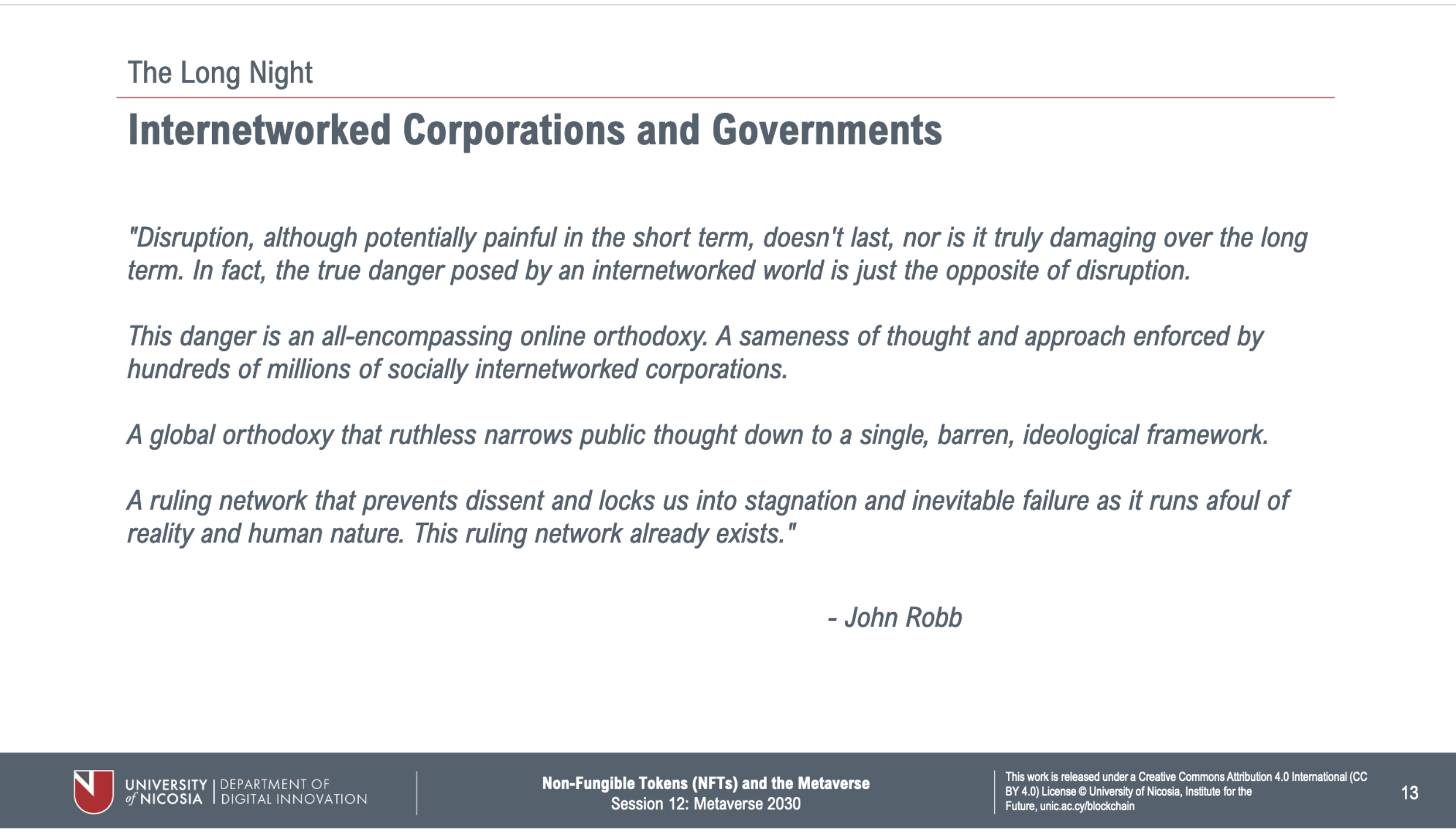Session 12-1: This article is a thread originally posted on Twitter (linked here) summarizing study notes from the Fall 2022 semester of the University of Nicosia’s online course, META-511: NFTs and the Metaverse. Course materials can be found at the UNIC META-511 github account here. The author is not affiliated with University of Nicosia or the META-511 faculty.
1/ Summarizing my notes from session 12-1 of @unicmetaverse META-511✍️
In this session @punk6529 warns of the risks brought by an increasingly centralized Internet, and how we must pay attention to ensure we preserve freedoms we enjoy in the physical world for the digital world.
2/ The origins of the Internet can be traced back to 1972 as an initiative by DARPA (the Defense Advanced Research Projects Agency) in the US.
During the cold war, DARPA invented a network of networks, designed to enable decentralized communications resilient to nuclear attack.
3/ The decentralized design of the Internet subsequently enabled the creation of a free, open digital society which was permissionless by design.
Anyone can do anything on the Internet. Ideas that were once considered silly (e.g. Twitter), have become important social tools.
4/ The Internet became this way because there is no one that needs to grant permission to try new things. Any “choke points” would end up being used by those in power for their own objectives.
Decentralization is not a radical, anarchist idea, but how the Internet works today.
5/ As the user experience has become more streamlined, it is important to note that the Internet has become increasingly centralized at all layers.
ISPs control who has access to the Internet. Access may be shut down to prevent coordination efforts, or to preventing dissent.
6/ Our key communication tools are the social media platforms run by companies. Whenever there is a human in charge, they can decide (or be compelled) to take certain actions.
The fact such platforms depend on someone’s views on content moderation is already a failure of design.
7/ Algorithms are necessary on the Internet to avoid spam, but with large centralized providers, you have algorithmic risk, where censorship may suppress the dissemination of certain ideas.
The price or penalty of Google is in what you don’t see.
8/ Payments also rely on the existing fiat system, and as such, are subject to control by corporations and governments. This can range from a credit card being declined, to a bank account being frozen.
Most governments seek to maintain control over this domain.
9/ While the day to day experience on the Internet is getting better, existentially it is getting worse. The advantages of what is dominant drives a self-reinforcing loop of more data, better models, and more users.
Within this are risks towards democracy, or the Long Night.
10/ The Long Night is a concept by John Robb that says the more centralized a network becomes, the easier it is to reinforce certain rules or a certain way of thinking.
If you lose diversity of thought, you end up with a much less successful society because ideas do not compete.

11/ Societies that allow freedom of thought, speech, and action, outperform on all fronts. Quality of life of citizens, innovation, and dignity.
Even if you assume away bad intentions (which you shouldn’t), it is impossible for a small group of people to always be right.
12/ In the next 5-20 years, we will likely see 4th industrial revolution tech that is sci-fi level.
AI will be highly capable, CBDCs will program money, XR will change how we see the world, and Big Data collection will become much more prevalent to enable these advances.
13/ Over the years, our default assumptions as a society have changed. Cash used to be default normal (even wholesome), but now is regarded as default suspicious to prevent spending on “inappropriate” things.
We now carry microphones in our mobiles, and volunteer biometric data.
14/ In an increasingly centralized system, the powers that be exert ever more control. This is most prevalent through the payment system, which is why the freedom to transact is so important.
That the Canadian government could freeze bank accounts to end a protest is a 🚩
15/ The power those who control AI, CBDCs, XR, and Big Data will wield is something never bestowed on anyone before, almost at a superhuman scale.
It will be sold as socially desirable, but there is very little talk about who gets to decide, and how they can be challenged.
16/ There are certain discussions we must have as a society on digital rights.
-
The rights to privacy & ownership
-
The freedom to transact in a default allowed method (e.g. crypto)
-
The right to possess persistent digital objects on a public blockchain (e.g. NFTs)
17/ The decisions made over the next few years will determine the architecture of human rights in the 2030s.
The question is, will there be countries that run an open architecture. It won’t happen without people driving discussion on what they think they deserve.
18/ That is it for session 12-1!
It was memorable how 6529 explained there are two kinds of people; those who view digital as real, and those who do not.
It is worth asking the question, which group are you in? 🤔
Materials are at the link below👇